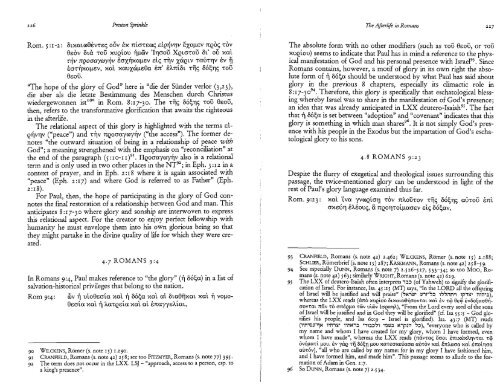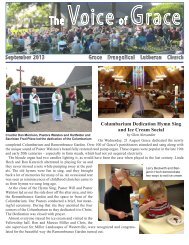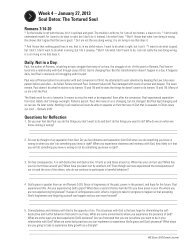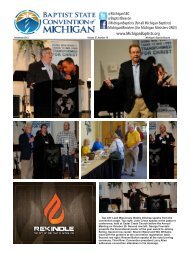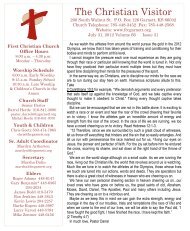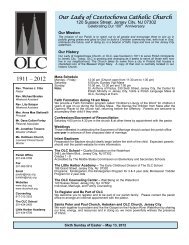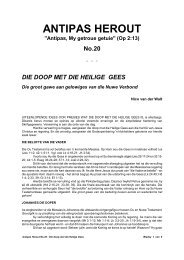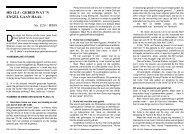Law and Life: Leviticus 18.5 in the Literary Framework of ... - Clover
Law and Life: Leviticus 18.5 in the Literary Framework of ... - Clover
Law and Life: Leviticus 18.5 in the Literary Framework of ... - Clover
You also want an ePaper? Increase the reach of your titles
YUMPU automatically turns print PDFs into web optimized ePapers that Google loves.
226 Preston Spr<strong>in</strong>kle i%e Afr~f;f. <strong>in</strong> Romans 227<br />
EXO~EV<br />
Rom. j :I-2: 6~xa~00.4~~~5 06v 6% nioz~oq ~ie7jvqv neb5 zbv<br />
OE~V 6~& TOG x~eiou fipGjv 'Iqoob Xe~ozoG 6~' 08 xai<br />
r7jv 7teo~aymy7jv ioxfixap~v &iq zfiv ~ dle~v zabzqv AV 5<br />
kozfixap~v, xai xau~hp~0a kn' ihni6~ zii5 665~5706<br />
8~0U.<br />
"The hope <strong>of</strong> <strong>the</strong> glory <strong>of</strong> God" here is "die der Si<strong>in</strong>der verlor (j,zj),<br />
die aber als die letzte Bestimmung des Menschen durch Christus<br />
wiedergewonnen i~t"~" <strong>in</strong> Rom. 8:17-30. The zqq 666q5 zob ~EoB,<br />
<strong>the</strong>n, refers to <strong>the</strong> transformative glorification that awaits <strong>the</strong> righteous<br />
<strong>in</strong> <strong>the</strong> afterlife.<br />
The relational aspect <strong>of</strong> this glory is highlighted with <strong>the</strong> terms ~ i-<br />
efivqv ("peace") <strong>and</strong> ztv neooayoyfiv ("<strong>the</strong> access"). The former denotes<br />
"<strong>the</strong> outward situation <strong>of</strong> be<strong>in</strong>g <strong>in</strong> a relationship <strong>of</strong> peace with<br />
God"; a mean<strong>in</strong>g streng<strong>the</strong>ned with <strong>the</strong> emphasis on "reconciliation" at<br />
<strong>the</strong> end <strong>of</strong> <strong>the</strong> paragraph (j:IO-I I)~'. neooayoyfiv also is a relational<br />
term <strong>and</strong> is only used <strong>in</strong> two o<strong>the</strong>r places <strong>in</strong> <strong>the</strong> NT9'; <strong>in</strong> Eph. j :12 <strong>in</strong> a<br />
context <strong>of</strong> prayer, <strong>and</strong> <strong>in</strong> Eph. 2:18 where it is aga<strong>in</strong> associated with<br />
"peace" (Eph. 2:17) <strong>and</strong> where God is referred to as Fa<strong>the</strong>r" (Eph.<br />
2:18).<br />
For Paul, <strong>the</strong>n, <strong>the</strong> hope <strong>of</strong> participat<strong>in</strong>g <strong>in</strong> <strong>the</strong> glory <strong>of</strong> God connotes<br />
<strong>the</strong> f<strong>in</strong>al restoration <strong>of</strong> a relationship between God <strong>and</strong> man. This<br />
anticipates 8 :I 7-3 o where glory <strong>and</strong> sonship are <strong>in</strong>terwoven to express<br />
this relational aspect. For <strong>the</strong> creator to enjoy perfect fellowship with<br />
humanity he must envelope <strong>the</strong>m <strong>in</strong>to his own glorious be<strong>in</strong>g so that<br />
<strong>the</strong>y might partake <strong>in</strong> <strong>the</strong> div<strong>in</strong>e quality <strong>of</strong> life for which <strong>the</strong>y were created.<br />
4.7 ROMANS 9:4<br />
In Romans 9:4, Paul makes reference to "<strong>the</strong> glory" (fi 66512) <strong>in</strong> a list <strong>of</strong><br />
salvation-historical privileges that belong to <strong>the</strong> nation.<br />
Rom 9:4: &V fi uioesoia xai fi 6650: xai ai G~aOfixa~ xai fi vo~o-<br />
8~oia xai fi hazecia xai ai <strong>in</strong>ayyshia~,<br />
90 WJLCKENS, Romer (s. note 15) 1.290.<br />
91 CRANRELD, Romans (s. note 42) 258; see too FITZMYER, Romans (s. note 77) 395.<br />
92 The term does not occur <strong>in</strong> <strong>the</strong> LXX. LSJ - "approach, access to a person, esp. to<br />
a k<strong>in</strong>g's presence".<br />
The absolute form with no o<strong>the</strong>r modifiers (such as zob esob, or zob<br />
xueiou) seems to <strong>in</strong>dicate that Paul has <strong>in</strong> m<strong>in</strong>d a reference to <strong>the</strong> physical<br />
manifestation <strong>of</strong> God <strong>and</strong> his personal presence with Israel9'. S<strong>in</strong>ce<br />
Romans conta<strong>in</strong>s, however, a motif <strong>of</strong> glory <strong>in</strong> its own right <strong>the</strong> absolute<br />
form <strong>of</strong> fi 665a should be understood by what Paul has said about<br />
glory <strong>in</strong> <strong>the</strong> previous 8 chapters, especially its climactic role <strong>in</strong><br />
8 :I 7-3 094. Therefore, this glory is specifically that eschatological bless<strong>in</strong>g<br />
whereby Israel was to share <strong>in</strong> <strong>the</strong> manifestation <strong>of</strong> God's presence;<br />
an idea that was already anticipated <strong>in</strong> LXX deutero-Isaiah9'. The fact<br />
that fi 66501 is set between "adoption" <strong>and</strong> "covenant" <strong>in</strong>dicates that this<br />
glory is someth<strong>in</strong>g <strong>in</strong> which man shares9! It is not simply God's presence<br />
with his people <strong>in</strong> <strong>the</strong> Exodus but <strong>the</strong> impartation <strong>of</strong> God's eschatological<br />
glory to his sons.<br />
4.8 ROMANS 9:23<br />
Despite <strong>the</strong> flurry <strong>of</strong> exegetical <strong>and</strong> <strong>the</strong>ological issues surround<strong>in</strong>g this<br />
passage, <strong>the</strong> twice-mentioned glory can be understood <strong>in</strong> light <strong>of</strong> <strong>the</strong><br />
rest <strong>of</strong> Paul's glory language exam<strong>in</strong>ed thus far.<br />
Rom. 9:zj: xai 'iva yvoeioy zbv nhoUzov zii5 665~5 arjzob <strong>in</strong>i<br />
oxsbq ih.40~5,<br />
665av,<br />
ti neoqzoipaosv &is<br />
93 CRANFIELD, Romans (s. note 42) 2.462; WJLCKENS, Romer (s. note 15) 2.188;<br />
SCHLIER, Rijmerbrief (s. note 15) 287; KASEMANN, Romans (s. note 42) 258-5 9.<br />
94 See especially DUNN, Romans (s. note 7) 2.526-527, 533-34; so too MOO, Romans<br />
(s. note 42) 563; similarly WRIGHT, Romans (s. note 42) 629.<br />
95 The LXX <strong>of</strong> deutero-Isaiah <strong>of</strong>ten <strong>in</strong>terprets la> (<strong>of</strong> Yahweh) to sign* <strong>the</strong> glorification<br />
<strong>of</strong> Israel. For <strong>in</strong>stance, Isa. 45 :25 (MT says, "In <strong>the</strong> LORD all <strong>the</strong> <strong>of</strong>fspr<strong>in</strong>g<br />
<strong>of</strong> Israel will be justified <strong>and</strong> will praise" ( 4 KYW uir-53 155;m-i lpl~ ;n;rqa),<br />
whereas <strong>the</strong> LXX reads (&nA xueiou G~xa~oOrjoovra~ xai 6v r@ O E kvtiocaoO4-<br />
~<br />
oovraL nBv rA on&.~a rGv uiGv Ioeaqk), "From <strong>the</strong> Lord every seed <strong>of</strong> <strong>the</strong> sons<br />
<strong>of</strong> Israel will be justified <strong>and</strong> <strong>in</strong> God <strong>the</strong>y will be glorified" (6. Isa 55 :5 - God glorifies<br />
his people, <strong>and</strong> Isa 60: - Israel is Isa. 43:7 (MT) reads<br />
(1-nqwu-7x 1-n,r3 rnni2 -ir,f mp,n h), "everyone who is called by<br />
my name <strong>and</strong> whom I have created for my. glory, whom I have formed, even<br />
whom I have made", whereas <strong>the</strong> LXX reads (nhvraq 6001 6n~xixkqvra~ r@<br />
6v6pari .LOU. kv yhe rfi 8659 pou xar~oxcbaoa abrbv xai hckaoa xai knoiqoa<br />
abrbv), "all who are called by my name: for <strong>in</strong> my glory I have fashioned him,<br />
<strong>and</strong> I have formed him, <strong>and</strong> made hlrn". This passage seems to allude to <strong>the</strong> formation<br />
<strong>of</strong> Adam <strong>in</strong> Gen. 2:7.<br />
96 So DUNN, Romans (s, note 7) 2.534.


